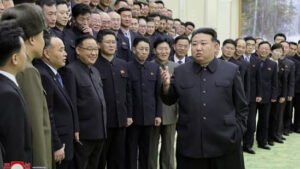![]()
North Korean leader Kim Jong Un said the country’s recent launch of a spy satellite was an exercise of its right to self-defence, as Pyongyang celebrated the event as showing it could strike anywhere in the world, state media reported.
North Korea said on Tuesday it had placed its first spy satellite in orbit, drawing international condemnation for violating UN resolutions that bar its use of technology applicable to ballistic missile programs.
Kim visited the National Aerospace Technology Administration (NATA) to applaud space scientists and technicians, and said Tuesday’s launch was an “eye-opening event” in the face of the “dangerous and aggressive” moves of the hostile forces, KCNA news agency reported.
“He said that the possession of reconnaissance satellite is a full-fledged exercise of the right to self-defense the DPRK armed forces can neither concede even a bit nor stop, even a moment,” KCNA said, using the initials of the North’s official name, the Democratic People’s Republic of Korea.
North Korea hosted a reception to celebrate the launch on Thursday, where Premier Kim Tok Hun said the satellite would develop the North Korean military into “the world’s best army possessed of capability for striking the whole world”.
State media photographs showed Kim’s family members joining the leader to celebrate the launch.
Kim’s daughter sat next to him at the banquet wearing a T-shirt with NATA’s logo, along with Kim’s wife, his sister, rocket scientists and engineers, state media photographs showed.
This week’s satellite launch was the North’s third attempt this year after two failures and followed Kim’s rare trip to Russia in September, during which President Vladimir Putin vowed to help Pyongyang build satellites.
South Korean officials said the latest launch most likely involved Russian technical assistance under a growing partnership that has seen Pyongyang supply Russia with millions of artillery shells.
Russia and North Korea have denied arms deals but have promised deeper cooperation.
South Korea has said that the North Korean satellite was believed to have entered orbit, but that it would take time to assess whether it was operating normally.






